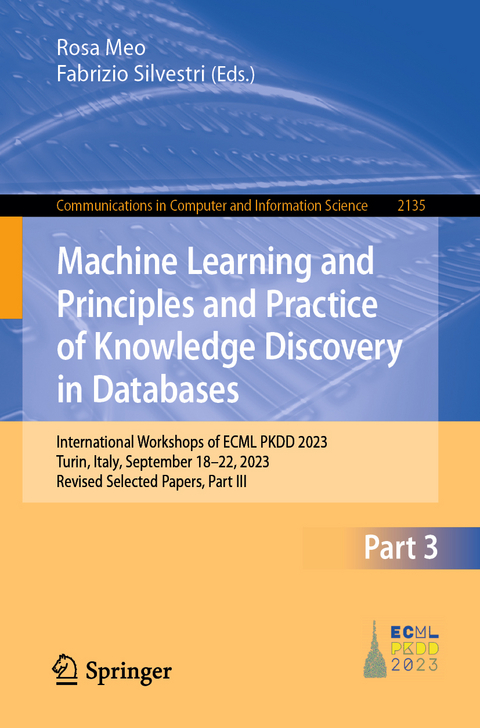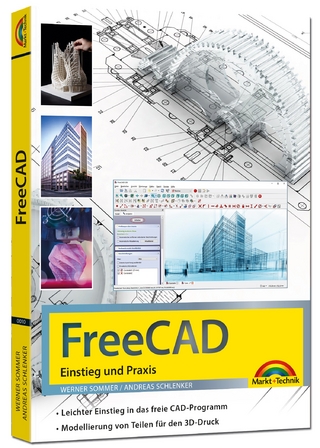
Machine Learning and Principles and Practice of Knowledge Discovery in Databases
Springer International Publishing (Verlag)
978-3-031-74632-1 (ISBN)
- Noch nicht erschienen - erscheint am 09.02.2025
- Versandkostenfrei innerhalb Deutschlands
- Auch auf Rechnung
- Verfügbarkeit in der Filiale vor Ort prüfen
- Artikel merken
The five-volume set CCIS 2133-2137 constitutes the refereed proceedings of the workshops held in conjunction with the Joint European Conference on Machine Learning and Knowledge Discovery in Databases, ECML PKDD 2023, which took place in Turin, Italy, during September 18-22, 2023.
The 200 full papers presented in these proceedings were carefully reviewed and selected from 515 submissions. The papers have been organized in the following tracks:
Part I: Advances in Interpretable Machine Learning and Artificial Intelligence -- Joint Workshop and Tutorial; BIAS 2023 - 3rd Workshop on Bias and Fairness in AI; Biased Data in Conversational Agents; Explainable Artificial Intelligence: From Static to Dynamic; ML, Law and Society;
Part II: RKDE 2023: 1st International Tutorial and Workshop on Responsible Knowledge Discovery in Education; SoGood 2023 - 8th Workshop on Data Science for Social Good; Towards Hybrid Human-Machine Learning and Decision Making (HLDM); Uncertainty meets explainability in machine learning; Workshop: Deep Learning and Multimedia Forensics. Combating fake media and misinformation;
Part III: XAI-TS: Explainable AI for Time Series: Advances and Applications; XKDD 2023: 5th International Workshop on eXplainable Knowledge Discovery in Data Mining; Deep Learning for Sustainable Precision Agriculture; Knowledge Guided Machine Learning; MACLEAN: MAChine Learning for EArth ObservatioN; MLG: Mining and Learning with Graphs; Neuro Explicit AI and Expert Informed ML for Engineering and Physical Sciences; New Frontiers in Mining Complex Patterns;
Part IV: PharML, Machine Learning for Pharma and Healthcare Applications; Simplification, Compression, Efficiency and Frugality for Artificial intelligence; Workshop on Uplift Modeling and Causal Machine Learning for Operational Decision Making; 6th Workshop on AI in Aging, Rehabilitation and Intelligent Assisted Living (ARIAL); Adapting to Change: Reliable Multimodal Learning Across Domains; AI4M: AI for Manufacturing;
Part V: Challenges and Opportunities of Large Language Models in Real-World Machine Learning Applications; Deep learning meets Neuromorphic Hardware; Discovery challenge; ITEM: IoT, Edge, and Mobile for Embedded Machine Learning; LIMBO - LearnIng and Mining for BlOckchains; Machine Learning for Cybersecurity (MLCS 2023); MIDAS - The 8th Workshop on MIning DAta for financial applicationS; Workshop on Advancements in Federated Learning.
.- XAI-TS: Explainable AI for Time Series: Advances and Applications.
.- Introducing the Attribution Stability Indicator: a Measure for Time Series XAI Attributions.
.- LMFD: Latent Monotonic Feature Discovery.
.- LinC: Explaining Time Series Clusterings with User-Provided Constraints.
.- Explainable Long- and Short-term Pattern Detection in Projected Sequential Data.
.- XKDD 2023: 5th International Workshop on eXplainable Knowledge Discovery in Data Mining.
.- Matching the expert's knowledge via a counterfactual-based feature importance measure.
.- Explaining Fatigue in Runners Using Time Series Analysis on Wearable Sensor Data.
.- Wave Top-k Random-d Family Search: How to Guide an Expert in a Structured Pattern Space.
.- Diffusion-based Visual Counterfactual Explanations - Towards Systematic Quantitative Evaluation.
.- Exploring gender bias in misclassification with clustering and local explanations.
.- Are Generative-based Graph Counterfactual Explainers Worth It?.
.- FIPER: a Visual-based Explanation Combining Rules and Feature Importance.
.- Manipulation Risks in Explainable AI: The Implications of the Disagreement Problem.
.- Using Graph Neural Networks for the Detection and Explanation of Network Intrusions.
.- Game Theoretic Explanations for Graph Neural Networks.
.- From Black Box to Glass Box: Evaluating the Faithfulness of Process Predictions with GCNNs.
.- A New Class of Intelligible Models for Tabular Learning.
.- Deep Learning for Sustainable Precision Agriculture.
.- Plant Disease Detection using Deep Learning: A.
.- Proof of Concept on Pear Leaf Disease Detection.
.- Modelling Solar PV Adoption in Irish Dairy Farms using Agent-Based Modelling.
.- Deep Networks based Approach for Automatic Counting Panicles on UAV captured Paddy RGB Imagery.
.- The ACRE Crop-Weed Dataset for Benchmarking Weed Detection Models on Maize and Beans Fields.
.- Integrating Renewable Energy in Agriculture: A Deep Reinforcement Learning-based Approach.
.- Knowledge Guided Machine Learning.
.- Unsupervised Ontology- and Taxonomy Construction through Hyperbolic Relational Domains and Ranges.
.- A Filter-based Neural ODE Approach for Modelling Natural Systems with Prior Knowledge Constraints.
.- Towards Automatically Refining Low-Quality Domain Knowledge: A Case Study in Healthcare.
.- Lorentz-invariant augmentation for high-energy physics deep learning models.
.- Discovering SpatioTemporal Warning Contexts from Non-Emergency Call Reports.
.- SEEDOT: Tool for Enhancing Sentiment Lexicon with Machine Learning.
.- MACLEAN: MAChine Learning for EArth ObservatioN.
.- Detection and semantic description of changes in Earth Observation Time Series data.
.- Low-rank hierarchical clustering of PRISMA hyperspectral images to identify burned areas.
.- Next day fire prediction via semantic segmentation.
.- Robust Burned Area Delineation through Multitask Learning.
.- Burnt area extraction from high-resolution satellite images based on anomaly detection.
.- Seasonal average temperature forecast with the AutoGluonTS modern autoML tool.
.- MLG: Mining and Learning with Graphs.
.- Curvature-based Pooling within Graph Neural Networks.
.- Finding coherent node groups in directed graphs.
.- Neuro Explicit AI and Expert Informed ML for Engineering and Physical Sciences.
.- Constructing Neural Forms for Hard-Constraint PINNs with Complex Dirichlet Boundaries.
.- Enhancing generability: AutoML for robust denoising of strong gravitational lens systems.
.- Data-Efficient Interactive Multi-Objective Optimization Using ParEGO.
.- New Frontiers in Mining Complex Patterns.
.- Striving for Simplicity in Deep Neural Models Trained for Malware Detection.
.- On the Effectiveness of Non-negative Matrix Factorization for Text Open-set Recognition.
.- Real-time Anomaly Prediction from Cryptocurrency Time Series.
.- A Joint Analysis of Trajectory Mining and Process Mining for Smartphone User Behaviour.
.- Towards Automation of Pollen Monitoring - Dealing with the Background in Pollen Monitoring Images.
| Erscheint lt. Verlag | 9.2.2025 |
|---|---|
| Reihe/Serie | Communications in Computer and Information Science |
| Zusatzinfo | X, 555 p. |
| Verlagsort | Cham |
| Sprache | englisch |
| Maße | 155 x 235 mm |
| Themenwelt | Informatik ► Grafik / Design ► Digitale Bildverarbeitung |
| Informatik ► Theorie / Studium ► Künstliche Intelligenz / Robotik | |
| Informatik ► Weitere Themen ► Hardware | |
| Schlagworte | Artificial Intelligence • Bayesian networks • Computer Security • computer vision • Data Mining • Data Security • Distributed Systems • Fuzzy Sets • Image Processing • inference engines • Information Retrieval • Neural networks • Semantics • Software Design • Software engineering |
| ISBN-10 | 3-031-74632-5 / 3031746325 |
| ISBN-13 | 978-3-031-74632-1 / 9783031746321 |
| Zustand | Neuware |
| Haben Sie eine Frage zum Produkt? |
aus dem Bereich


